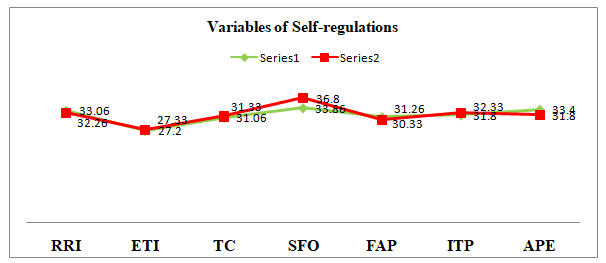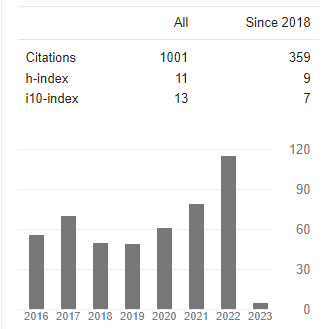The Aanalogizable Psychological Study of Selected Variables of Self-Regulation Among Sportspersons and Non-Sportspersons of India
Abstract
The research scholar selected this study to compare selected self-regulation variables between sportspersons and non-sportspersons of India. Objective; Keeping the objective in mind, the researcher prepared two groups, one in which the experiment group is for sportspersons and the other control group for non-sportspersons. A total of 100 subjects were randomly selected. The age of all selected subjects in this research study ranged from 18 to 25 years. Scale; According to the supervisor's and research experts' guidance, the research scholar used the Self-Regulation Questionnaire (SRQ; (Brown, 1999) to measure self-regulation. The above-mentioned Questionnaire had high reliability and acceptable construct validity. Therefore, the scales were found to have adequate properties and to be applicable in research and practice. Hypothesis: It is inferred from this study that there would be no statistically significant difference in psychological measures between sportspersons and non-sportsperson. To compare self-regulation with psychological well-being, the research scholar used descriptive statistics and paired group t–Test in the IBM SPSS® data analysis package. Results: In the present research study, it was found that there was no statistically significant difference in the selected psychological measure, namely Self-regulation among the sportspersons and non - sportspersons.
Downloads
References
Baumeister, R. F. (2004). Handbook of self-regulation: Research, theory, and applications. 750 First Street NE, Washington, DC 20002-4242, USA: The Guilford Press. Retrieved NOV 12, 2022, from https://psycnet.apa.org/search/print
Brown, J. M. (1999). The self-regulation questionnaire. (T. Jackson, Ed.) Innovation in clinical practice, 281-292.
Cristina Marina Sandu et.al. (2015, May 05). Comparative study on emotions analysis in students of psychology by gender. Procedia - Social and Behavioral Sciences, 180, 1638-1642. doi: Elsevier Ltd.
Konabe Bene et.al. (2021). A Comparative Study of Self-Regulation Levels and Academic. Journal of Turkish Science Education, 18(3), 320-337. Retrieved Jan 15, 2023
Marie-Claude J. Gagnon's et.al. (2016, May). Self-regulation capacity enhances well-being and reduces burnout in physicians and medical students: Implications for nurturing self-help skills. nternational Journal of Wellbeing, 1(6), 101-116. doi:10.5502/ijw.v6i1.4
Megan M Mcclelland. (2017). Self-Regulation, Handbook of Life Course Health Development. doi: 10.1007/978-3-319-47143-3_12
Ozhiganova, G. V. (2018, January). SELF-Regulation And Self-Regulatory Capacities: Components, Levels, Models. RudN Journal of Psychology and Pedagogics, 15(3), 255-270. Retrieved Feb 04, 2023, from https://www.researchgate.net/publication.
Sarah K. Davis et.al. (2021). Exploring differences in psychological well-being and. Frontline Learning Research, 9(1), 30-43. Retrieved Jan 16, 2023
Surjeet Singh, R. S. (2018, March). Self-Regulation as a Correlate of Psychological Well-Being. Indian Journal of Health and Wellbeing, 441- 444. Retrieved Jan 16, 2023
Virtanen, Päivi. (2017, December). Active Learning and Self-Regulation Enhance. Australian Journal of Teacher Education, 42(12). Retrieved Feb 2, 2023, from https://files.eric.ed.gov/fulltext/EJ1164999.
Abdalkareem Jasim S, Singh M, Al-Dhalimy AMB, Zwamel AH, Jawad IA, Shalaby NS. The Impact of Chronic Exercise on Cognitive Function: An Overview of Reviews. Iran J Psychiatry. 2024;19(4):463-472. https://ijps.tums.ac.ir/index.php/ijps/article/view/3895
Yasmin Basheer Ahmed, Saade Abdalkareem Jasim, Yasser Fakri Mustafa, Beneen Husseen, Thoraya Mahbas Diwan, Mandeep Singh, The effects of propolis supplementation on lipid profiles in adults with metabolic syndrome and related disorders: A systematic review and meta-analysis of randomized controlled trials, Human Nutrition & Metabolism,Volume 37,2024,200276,ISSN 26661497,https://doi.org/10.1016/j.hnm.2024.200276.(https://www.sciencedirect.com/science/article/pii/S266614972400038
Alameri AA, Ghanni MU, Ali A, Singh M, Al-Gazally ME, Almulla AF, Alexis Ramírez-Coronel A, Mustafa YF, Gupta R, Obaid RF, Gabr GA, Farhood B. The Effects of Curcumin on Astrocytes in Common Neurodegenerative Conditions. Mini Rev Med Chem. 2023;23(22):2117-2129. doi: 10.2174/1389557523666230502143131. PMID: 37132107. https://pubmed.ncbi.nlm.nih.gov/37132107/
Singh, M., Kadhim, M.M., Turki Jalil, A. et al. A systematic review of the protective effects of silymarin/silibinin against doxorubicin-induced cardiotoxicity. Cancer Cell Int 23, 88 (2023). https://doi.org/10.1186/s12935-023-02936-4 https://cancerci.biomedcentral.com/articles/10.1186/s12935-023-02936-4
Mandeep Singh Nathial, Analysis of set shot in basketball in relation with time to perform the course and displacement of center of gravity, American Journal of Sports Science, Vol.2 Issue.5 pp: 122-126 (2014). Retrieved from https://www.sciencepublishinggroup.com/journal/paperinfo.aspx?journalid=155&doi=10.11648/j.ajss.20140205.13
Singh, M., Kour, R., & Kour, A.,. A collaborative diversified investigation of respective responses of sports person coaches and organizations on criminalization of doping.International Journal of Health Sciences,6(S3), 11295–11310. https://doi.org/10.53730/ijhs.v6nS3.8641
Singh, A., & Singh , D. M. (2013). PROMOTION OF RESEARCH CULTURE –ENHANCING QUALITY IN HIGHER EDUCATION. International Journal of Behavioral Social and Movement Sciences, 2(2), 202–208. Retrieved from https://ijobsms.org/index.php/ijobsms/article/view/152
SINGH, M., & SINGH SIDHU, A. (2016). A COMPARATIVE STUDY OF BODY COMPOSITION AND RELATIVE HEALTH STATUS AMONG RESIDENT AND NON-RESIDENT STUDENTS IN DIFFERENT SCHOOLS OF J&K. International Journal of Behavioral Social and Movement Sciences, 5(3), 08–13. Retrieved from https://ijobsms.org/index.php/ijobsms/article/view/320
Singh Nathial, D. M. (2012). ANALYZING THE CREDIT BASED SYSTEM IN PHYSICAL EDUCATION. International Journal of Behavioral Social and Movement Sciences, 1(3), 172–176. Retrieved from https://ijobsms.org/index.php/ijobsms/article/view/37
SHARMA, N. P., & SINGH, M. (2014). SENIOR AGE GROUP RELATIVE EXERCISES AND IMPACT ON THEIR LIFESTYLE. International Journal of Behavioral Social and Movement Sciences, 3(04), 78–82. Retrieved from https://ijobsms.org/index.php/ijobsms/article/view/246
CHAND PURI, P., MISHRA, P., JHAJHARIA, B., & SINGH, M. (2014). COORDINATIVE ABILITIES OF VOLLEYBALL IN DIFFERENT AGE GROUPS: A COMPARATIVE STUDY. International Journal of Behavioral Social and Movement Sciences, 3(3), 56–68. Retrieved from https://ijobsms.org/index.php/ijobsms/article/view/228

Copyright (c) 2023 Ravinder Kumar, Anand Kumar Singh, Vikaram Singh, T. Onima Reddy

This work is licensed under a Creative Commons Attribution 4.0 International License.














